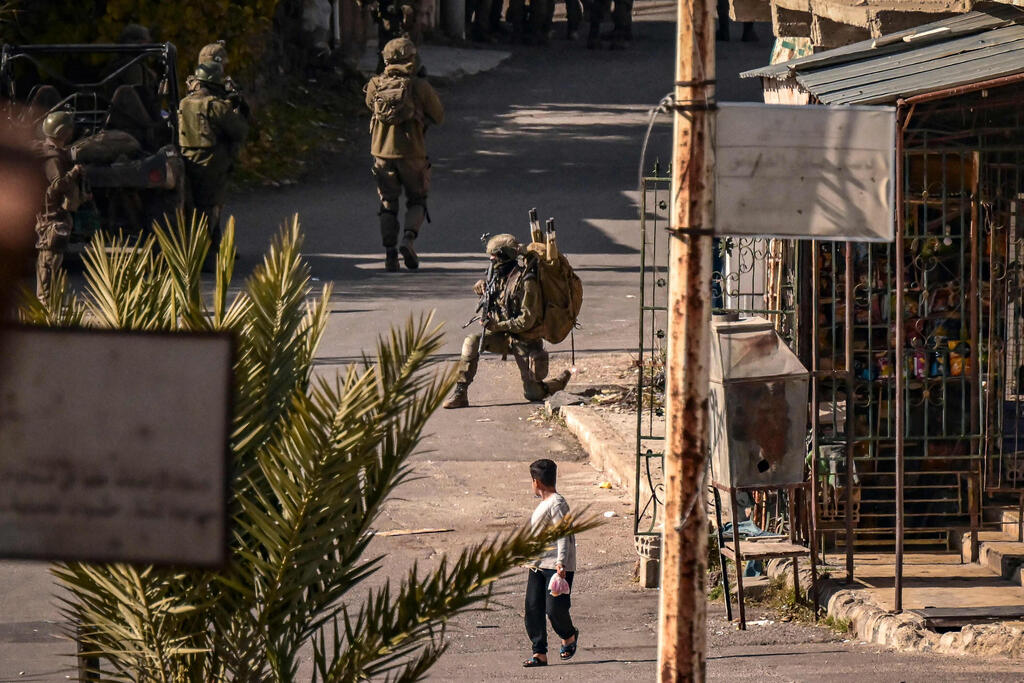As Donald Trump avoids commenting on U.S. operations in Syria, Israeli officials express concern over what they perceive as excessive enthusiasm from the outgoing American administration toward Syrian rebel leader Ahmad al-Sharaa, formerly known as Abu Mohammed al-Golani.
Direct dialogue between the U.S. and the rebels has been ongoing since the fall of the Assad regime, culminating in the lifting of a $10 million bounty on al-Sharaa’s head, once placed for his jihadist activities.
IDF troops in Jubata al-Hashab, Syria
While Washington acknowledges Israel’s security concerns, it advocates giving the new Syrian government under al-Sharaa a chance. Israeli officials, however, remain cautious, saying, “The burden of proof is on al-Sharaa and his team. We must not forget their ideological roots.”
The IDF is currently active in the buffer zone and the Syrian Golan Heights, areas it secured after Assad’s fall. Tensions in local villages have risen, despite some cooperation.
In Jubata al-Hashab, IDF troops reportedly demanded residents surrender their weapons, promising military action if compliance was not met within 48 hours. Similar incidents occurred in other villages, including Khader and Maariah, where protests over the weekend led to clashes.
Israel’s immediate priority is securing its northern border communities. Officials believe the IDF should maintain its presence while monitoring the new Syrian government’s alliances and regional dynamics.
Al-Sharaa has publicly emphasized inclusivity, pledging parliamentary representation for all ethnic groups and avoiding conflict with Israel, Druze, Alawites or Turks. However, Israeli skepticism runs high, especially following the October 7 attacks, with concerns over a potential “charm offensive” masking ulterior motives.
Al-Sharaa, formerly affiliated with al-Qaeda and once the leader of Jabhat al-Nusra, has distanced himself from extremist Sunni terror groups, embracing Syrian nationalism instead. While he speaks of a unified, democratic Syria, Israeli officials question his ability to deliver on these promises.
Locals protest Israeli presence in southern Syria
Meanwhile, Israel anticipates eventual tension with the new Syrian government over its presence in the buffer zone, particularly as al-Sharaa consolidates power. Observers suggest that adherence to the 1974 Disengagement Agreement could stabilize the region if Syrian forces refrain from threatening Israel, a dynamic that held for nearly five decades under Assad.
Get the Ynetnews app on your smartphone: Google Play: https://bit.ly/4eJ37pE | Apple App Store: https://bit.ly/3ZL7iNv
Foreign Minister Gideon Sa’ar expressed doubts during a classified session of the Knesset Foreign Affairs and Defense Committee: “The new Damascus government mirrors Idlib’s extremist leadership. They present themselves as moderate to the West, which is eager to legitimize them to facilitate refugee repatriation.”
Israel continues quiet dialogue with Turkey, whose interests in Syria are significant. Talks between Israeli intelligence agencies, including the Mossad and Shin Bet, and Turkey’s MIT intelligence service are underway. Prime Minister Benjamin Netanyahu has called for a policy review on relations with Turkey amid these discussions.
The Houthi challenge
The Houthis have intensified their missile launches toward Israel, with millions in central Israel awakened by alarms four times in the past week. A missile struck a school in Ramat Efal, while another landed near residential buildings in Tel Aviv, causing significant damage.
Israel faces a strategic dilemma amid these attacks, with factors including the upcoming U.S. administration change on January 20, the Houthis' distant location complicating military action and the broader desire to address threats from Iran.
Currently, U.S.-Israeli cooperation against the Houthis remains close. The U.S. leads a coalition of 12 nations targeting Houthi operations at sea, but its effectiveness has waned. With fewer commercial ships traversing the Red Sea and Suez Canal, the Houthis have largely shifted focus away from maritime attacks.
Israeli officials note the Houthis are emboldened, in contrast to low morale among other Iranian-aligned groups, which have faced significant setbacks. Once obscure, the Houthi militia is now gaining support in the Arab world and has been sustaining operations against Israel for over a year.
Israel plans to engage with the incoming Trump administration on addressing both the Houthi threat and the broader Iranian issue. Meanwhile, Sa’ar has launched a diplomatic campaign to expand the international designation of the Houthis as a terrorist organization.
Already labeled a terrorist group in the U.S., Saudi Arabia, Malaysia, the UAE, Australia, Canada, New Zealand and Israel, Sa’ar emphasized the global risk they pose. “The Houthis are a threat not just to Israel but to the region and world order. Their direct attacks on one of the world’s busiest shipping lanes challenge international stability. Declaring them a terrorist organization is the first and necessary step,” he said.
4 View gallery


Defense Minister Israel Katz visits an Arrow missile defense battery with Air Defense Command head Brig. Gen. Gilad Biran
(Photo: Defense Ministry)
Amid this backdrop, Defense Minister Israel Katz visited an Arrow missile defense battery with Air Defense Command head Brig. Gen. Gilad Biran. Katz praised the unit for their success in intercepting a ballistic missile launched by the Houthis overnight.
Katz received an operational briefing from 136th Battalion Commander Lt. Col. Eyal Frankel and other officers. "Israel has the best air defenses in the world," Katz said. "Millions rely on you. They wake up to alarms but trust you to handle the threat. We won’t tolerate continued Houthi attacks on Israel. Just as we dealt with Sinwar in Gaza, Haniyeh in Tehran and Nasrallah in Beirut, we will deal with Houthi leaders in Sanaa and across Yemen."
Katz added, "We will target their infrastructure and leadership to eliminate the threat. Those sponsoring Houthi terror in Hodeidah or Sanaa will pay the full price. We trust only the IDF to protect our citizens and won’t allow new threats to emerge. Today’s missile warfare is the first of its kind, and you will continue defending Israel’s skies while we strike decisively to remove these threats."








